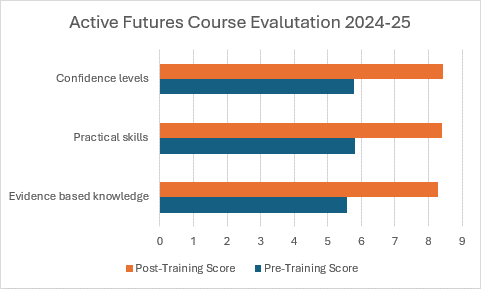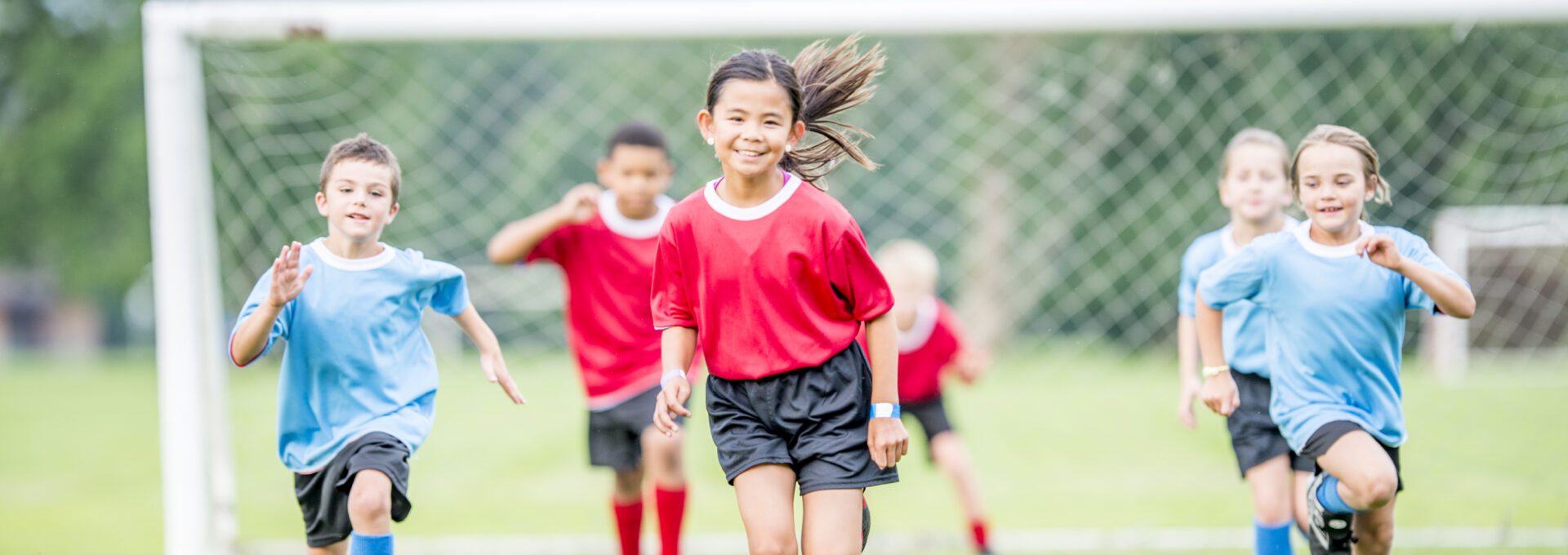The Programme
The Active Futures professional development programme was launched in March 2024, running through to March 2025 as a pilot year. It was developed and co-delivered in partnership with Norfolk County Council’s Early Years colleagues.
This programme is tailored towards early years professionals, helping them to enhance their practice in creating active environments for young children across their whole setting.

The programme aims to:
- Influence change in practitioners’ practices, enabling them to confidently embed physical activity messages and strategies into their daily routines. The goal is to ensure children engage in regular, developmentally appropriate physical activities that promote health and well-being.
- Foster a culture of physical activity whilst empowering educators to create environments that prioritise physical development, supporting children’s health and developmental outcomes now and in the future.
Through this approach, the training aims to positively influence practice, building a community of practitioners to ensure a physically active culture that benefits children’s overall development and builds momentum for system change.
2024-2025 Data Insights for Active Futures
Impact Summary
Since its launch in March 2024, the Active Futures pilot has engaged 10 early years settings across Norfolk, with several more on a growing waiting list – demonstrating clear demand and interest from the sector. The success of the pilot highlights the enthusiasm of early years professionals to embrace new approaches to embedding physical activity into daily routines.
A key strength of the programme has been its foundation in collaborative partnerships. The training was co-developed and co-delivered with Norfolk Country Council’s Early Years team, ensuring the content is aligned with both local and national priorities for early childhood development. This partnership approach has helped build trust and relevance, making the training highly practical and context specific.
An important evolution in the programme’s design has been a shift from training individual practitioners to training entire settings. This whole-setting approach ensures that physical activity becomes embedded in the culture of the setting, not just the responsibility of one individual. It allows for consistent messaging, peer support, and a shared commitment to creating active learning environments that benefit all children.
Looking ahead, the ambition is to secure further funding to expand the project beyond the pilot phase. This will allow Active Futures to reach more early years settings across Norfolk, increase workforce capacity, and ultimately contribute to improved health and developmental outcomes for a broader population of children. Future developments may also include the introduction of tailored resources, ongoing mentoring, and evaluation frameworks to measure long-term impact.
The programme’s early success, strong partnerships, and responsive design have laid the groundwork for sustainable growth, with the ultimate goal of embedding physical activity as a core element of early years practice county-wide.
Little Squirrels has emerged as a shining example of what can be achieved when a setting fully embraces the Active Futures training. Their commitment to embedding physical activity into every aspect of their daily practice has led to a significant shift in both staff mindset and children’s engagement.
Following their participation in the training, the setting made a conscious and sustained investment in creating an active environment that supports the physical development of children under five. This has included redesigning indoor and outdoor spaces to encourage movement, incorporating structured and unstructured active play throughout the day, and confidently facilitating risk-based play to support motor skill development and resilience.
The impact has been clear: staff report increased confidence in delivering physical activity across all areas of learning, and children are now more active, more engaged, and demonstrating improved physical skills. More importantly, physical activity is no longer seen as a standalone element—it’s now an integral part of the setting’s ethos and daily routine, ensuring that children are better equipped for healthy futures.
Little Squirrels stands as a powerful example of how targeted training, when met with genuine commitment from a setting, can drive meaningful and lasting change for young children’s health and development.
To monitor and evaluate the impact of our training on early years professionals, we conduct pre- and post-course evaluations with each cohort. These evaluations focus on key areas such as confidence levels, evidence-based knowledge, and practical skills. The data collected has enabled us to calculate average scores across the year.
The graph below illustrates the measurable increase in competence levels following training.

"It's opened my mind and made me think outside of the box on different strategies to benefit children and their development further".
"Teachers have noticed that play is a lot more purposeful now, and more children have taken on board the 'organised games'. They've enjoyed being taught the rules of games and they like that structure."
“It's great to see what we have learnt from the training is having a positive impact on the children too!"
"It’s made me think about what our setting looks like to our children and the importance of bringing movement into everything we do. Also about using ourselves as the resources, instead of thinking we need to buy things - tap into my imagination.".
"We definitely recommend it to other settings. It helped us build relationships. Being there together enabled us all to gain confidence in our own abilities and ideas, get involved and contribute, allowing everyone to have a say."
